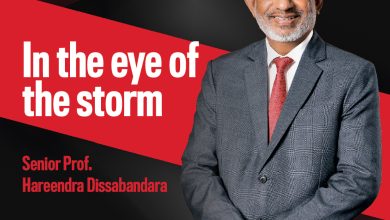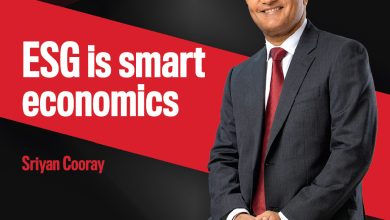JOHN KEELLS HOLDINGS

John Keells Holdings (JKH) lays claim to being the largest company listed on the Colombo Stock Exchange (CSE).With operations encompassing more than 70 companies across seven diverse sectors, the group takes pridein having made its mark in virtually every major industry in Sri Lanka and growing with the nation. A memberof the World Economic Forum (WEF) and the UN Global Compact, JKH drives its vision of ‘empoweringthe nation for tomorrow’ through the John Keells Foundation, and operates the social entrepreneurshipproject Plasticcycle with a view to being a catalyst in substantially reducing plastic pollution in Sri Lanka.
Q: How does the group view accolades and awards – and what impact do they have on team morale and brand image?
 A: Being conferred awards by credible third parties as well as unbiased public opinion driven recognition could go a long way in solidifying an organisation’s reputation as a trustworthy brand. Moreover, it increases visibility across all stakeholder groups.
A: Being conferred awards by credible third parties as well as unbiased public opinion driven recognition could go a long way in solidifying an organisation’s reputation as a trustworthy brand. Moreover, it increases visibility across all stakeholder groups.
Winning awards also pushes us to raise the bar for excellence. We’re cognisant that achieving excellence is only possible through a team of dedicated, innovative and talented professionals who are committed to implementing business processes in line with our values – viz. integrity, trust, excellence, innovation and caring – which enables us to achieve our triple bottom line goals.
Being recognised for these efforts is important to build high-performing teams, and boost team spirit and morale. It is by continuing to invest in our people that they will be motivated to go the extra mile that may result in special recognition.
We are proud to be ranked first among LMD’s Most Respected entities and attribute this recognition to the commitment of our people at John Keells.
 Q: In what way has the group’s approach to diversity and inclusion garnered respect?
Q: In what way has the group’s approach to diversity and inclusion garnered respect?
A: An organisation’s position on being inclusive and having a diverse workforce plays a vital role in public perception, which impacts corporate reputation – especially in attracting a wider talent pool directly through its own messaging and indirectly via existing employees’ recommendations.
The business case for diversity and inclusivity is clear: it increases our talent pool, introduces innovation, and begins rich discussions and debates during decision making. John Keells has always been progressive in its approach to valuing diversity in the workforce.
 Our approach to diversity, equity and inclusion (DE&I) has shown that people are happy, and do their best work when treated with respect, dignity and fairness. It is important that everyone can be their true selves and has equal opportunity for growth.
Our approach to diversity, equity and inclusion (DE&I) has shown that people are happy, and do their best work when treated with respect, dignity and fairness. It is important that everyone can be their true selves and has equal opportunity for growth.
We continuously seek improvement in our DE&I journey – this includes learning best practices and benchmarking against global success stories while understanding the challenges we face in Sri Lanka, in terms of stereotyping and perceptions, and setting goals and commitments to do better.
Given the wide spectrum of work undertaken in the DE&I sphere by John Keells, we launched the ONE JKH brand, which communicates that irrespective of our race, religion, gender identity, sexual orientation, age and ability, at JKH we are one. The colours used in the logo represent gender parity, being differently abled and LGBTIQ persons.
The ONE JKH initiative has the full commitment of the leadership team, and I believe that all of us at John Keells are advocates and ambassadors of this brand. All initiatives under the brand are spearheaded by the DE&I team, and we have goals and key performance indicators (KPIs) to track our progress in these initiatives while teams in each of our sectors lead these.
Q: What role can corporates play in uplifting Sri Lanka’s image on the international stage?
A: The private sector can play a major role in the international perception of a country. I believe that through the diverse networks and synergies that have evolved between JKH and its many local and global partners, we have been able to do so.
 Our leisure brand Cinnamon was instrumental in initiating the process that led to Sri Lanka being stamped a safe destination by the World Travel & Tourism Council (WTTC) last year.
Our leisure brand Cinnamon was instrumental in initiating the process that led to Sri Lanka being stamped a safe destination by the World Travel & Tourism Council (WTTC) last year.
Meanwhile, our integrated resort Cinnamon Life is positioned as Sri Lanka’s single largest private sector investment to date at over US$ 900 million, underpinning the confidence we have in the underlying opportunity for Sri Lanka in the eyes of the international community.
South Asia Gateway Terminals (SAGT) was the first private port terminal in the country and played a pivotal role in establishing the Port of Colombo as one of the leading transshipment hubs in Asia.
And this year, in its capacity as the local partner, JKH received a letter of intent to develop and operate the West Container Terminal at the Port of Colombo as a public-private partnership project within a consortium comprising Adani Ports and Special Economic Zone.
These are merely some instances of JKH leading initiatives within the private sector that would positively impact our nation’s image in the international space.
Q: Does social responsibility continue to be a part of the ‘corporate respect’ equation – and how can corporates leverage respect earned during the COVID-19 crisis?
A: The JKH approach to social responsibility and environmental sustainability is executed through the John Keells Foundation. Our social entrepreneurship projects such as Plasticcycle, our businesses and all these initiatives are supported by adhering to the Global Reporting Initiative (GRI) framework, and aligned to UN Global Compact and Sustainable Development Goals (SDGs).
This will continue to be a major focus for us, and I believe transparency in reporting on these initiatives plays an important role in public perception and corporate respect.
Notwithstanding the challenges posed by the pandemic, our commitment to addressing social and environmental issues continues.
Some of our most recent initiatives include a partnership with Ruk Rakaganno to reforest 20 hectares in Suduwalipotha; empowering women in the batik and paper craft sectors, by training them and providing a marketplace for sustainable self-employment; investing in a plastic waste collection centre with the startup Zerotrash; and expanding our Plasticcycle recyclable plastic waste collection bin network.
Supporting our communities during the pandemic is of utmost importance to us, and gaining respect as a responsible corporate is organic as we don’t focus on leveraging it.
JKH says it supports small-scale businesses in its value chain where possible, and provides dry rations and meals to communities through Cinnamon’s Meals that Heal programme. The conglomerate also helps fund a molecular virology laboratory at the National Institute of Infectious Diseases (IDH) while some of its properties were converted to quarantine centres or interim care facilities to support and empower communities during this challenging time.
Krishan Balendra
Chairman
www.keells.com





